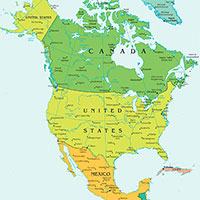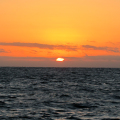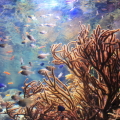Celebrating the Big Blue
Malcolm J | June 8, 2015.
The ocean is both the heart and lungs of the planet we call Earth. Harvesting light energy for photosynthesis, algae provides 50 per cent of the oxygen that we breathe. The ocean regulates the climate of the planet by absorbing excess carbon dioxide and heat, provides food for billions of people every year, and is a source of genetic materials necessary for developing new medicines. The ocean is home to an estimated 1.6 million different species, some of which even defy the categories of plants and animals. Forming the basis of World Oceans Day, these facts provide a reason to “celebrate the beauty, wealth, and promise of the ocean.”
Proposed in 1992 by Canada, the day has been celebrated unofficially until it was recognised by the United Nations in 2008. Since then it has been coordinated internationally by the World Ocean Network (an international association working to raise awareness on the importance of the ocean for humanity) and The Ocean Project (an organisation advancing ocean conservation in partnership with zoos, aquariums, and museums around the world) with growing global participation. The purpose of June 8 is to honour the world’s oceans, celebrate its products, and to appreciate its own intrinsic value.
“How inappropriate to call this planet earth when it is quite clearly ocean.” —Arthur C Clarke
Almost three-quarters of the Earth is ocean and, yet much of the vast blue continues to remain unprotected. Around 85 per cent of global fish stocks are over-exploited, depleted, fully exploited, or in recovery from exploitation. Not only is this bad news for the fish but, also the millions of people who rely on fish for their main source of protein.
The focus of World Oceans Day this year is to stop plastics from degrading the ocean through the theme: ‘Healthy Oceans, Healthy Planet’.
Research has found that there are approximately 46,000 pieces of plastic per square mile floating in the waters resulting in one million sea bird and 100,000 marine mammal deaths. The issue is two-fold in that: it takes 500-1,000 years for plastics to degrade, and our incessant use of plastic, with 35 billion plastic bottles being thrown away and more than one million plastic bags being used every minute.
By participating in World Oceans Day, people are contributing to a global movement to become stewards of the ocean. Unfortunately, public awareness of the issues facing the seas has increased very little over the last decade despite the threats being more serious than ever before, based on research conducted by The Ocean Project.
Celebrating World Oceans Day is as simple as joining in one of the hundreds of events happening all over the world, many of which are free to participate in. The Ocean Project also encourages everyone to “wear blue and tell two;” just wear a blue shirt or other noticeable article of clothing and ask people if they know why. Share two facts about the ocean, or two ways that they can help protect it and its wildlife. Then ask them to pass it on.
In 1990, two years before the first World Oceans Day, the Voyager 1 space probe took a picture of planet Earth from about 6 billion kilometres away that left our entire planet looking like a pale blue dot. Titling his book “Pale Blue Dot”, Carl Sagan expressed his thoughts on the deeper meaning of the image:
“From this distant vantage point, the Earth might not seem of any particular interest. But for us, it’s different. Consider again that dot. That’s here. That’s home. That’s us. On it everyone you love, everyone you know, everyone you ever heard of, every human being who ever was, lived out their lives… There is perhaps no better demonstration of the folly of human conceits than this distant image of our tiny world. To me, it underscores our responsibility to deal more kindly with one another and to preserve and cherish the pale blue dot, the only home we’ve ever known.”
From our vantage point, 25 years later, we know more about the planet and the importance of the ocean more than ever before. We know that our every action has a lasting impact on the current and future state of the vast blue seas. Sustainable management of the ocean is within our grasp. This one day of celebration for its beauty is just a friendly reminder of our imperative to take the responsibility to care for the ocean as it cares for us.













comment